A blog dedicated to providing current, easy-to-read, and helpful health and research information.
Don't wanna be here? Send us removal request.
Photo
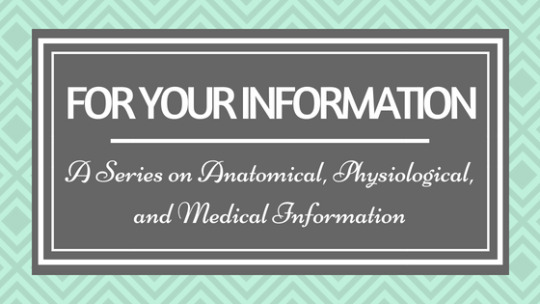
ANNOUNCING: The For Your Information Series
Want to learn more about a specific diagnosis or condition? Have a question about one of the body’s many organ systems? Simply curious about anatomy and physiology and when those things go awry? We suggest For Your Information!
The aim of this series is to present easy-to-read and useful information regarding health conditions, disorders and diagnoses, organs and organ systems, and current treatment and research findings. While we have general topics we would like to discuss, we also want to provide topics that are important or interesting to you.
Either through inbox, email ([email protected]), or reply to this post, tell us about the topics you want to read about.
We hope to bring you prevalent and engaging material to help you better understand anatomical, physiological, and medical information.
Thank you for you support!
14 notes
·
View notes
Text
Upcoming Topics

Here are a few of the articles and materials we hope to address in the near future.
Grant’s Art Toollbox: Adapted Repurposed Tools
Functional and Fasionable: An Interprofessional Experience Exploring Fashion Design
Supporting Play Between Children and Their Parents With Physical Disabilities
Mobile Technologies as Workplace Cognitive-Behavioral Aids for People With Autism
Using Typical School Routines to Build Transition Skills: A Paradigm Shift in Community-Based Instruction
Productive, Safe, and Healthy: An Aging-in-Place Program for Older Adults
Transportation Transitions: Addressing Current and Future Transportation Needs of Older Adults
Clear Communication: Modifying Outcome Measures to Support Participation for People With Aphasia
Thinking it Through: Mental Practice for Improving Motor Recovery and Activity Performance in Clients With Stroke
Interested in these topics? Want to learn more? Are there other topics you want discussed?
Bring your comments to HealthSum!
1 note
·
View note
Text
We Want to Hear from You!

Tell the HealthSum Team Your Interests and Suggestions
As a new blog hoping to provide easy-to-read and useful information regarding health and research, we want to provide information that’s most important to you.
Either through inbox, email ([email protected]), or reply to this post, tell us about the topics you want to read about.
Topics can include, but are not limited to:
Adaptive equipment, like home modifications, school modifications, etc.
Neurological conditions, like Alzheimer’s, Parkinson’s, etc.
Common pediatric conditions, like Autism Spectrum Disorder, Cerebral Palsy, Attention Deficit Hyperactivity Disorder, etc.
Most prevalent diagnoses, like diabetes, stroke, heart attack, etc.
Thank you for your support!
16 notes
·
View notes
Text
We Want to Hear from You!

Tell the HealthSum Team Your Interests and Suggestions
As a new blog hoping to provide easy-to-read and useful information regarding health and research, we want to provide information that’s most important to you.
Either through inbox, email ([email protected]), or reply to this post, tell us about the topics you want to read about.
Topics can include, but are not limited to:
Adaptive equipment, like home modifications, school modifications, etc.
Neurological conditions, like Alzheimer’s, Parkinson’s, etc.
Common pediatric conditions, like Autism Spectrum Disorder, Cerebral Palsy, Attention Deficit Hyperactivity Disorder, etc.
Most prevalent diagnoses, like diabetes, stroke, heart attack, etc.
Thank you for your support!
16 notes
·
View notes
Text
We Want to Hear from You!

Tell the HealthSum Team Your Interests and Suggestions
As a new blog hoping to provide easy-to-read and useful information regarding health and research, we want to provide information that’s most important to you.
Either through inbox, email ([email protected]), or reply to this post, tell us about the topics you want to read about.
Topics can include, but are not limited to:
Adaptive equipment, like home modifications, school modifications, etc.
Neurological conditions, like Alzheimer’s, Parkinson’s, etc.
Common pediatric conditions, like Autism Spectrum Disorder, Cerebral Palsy, Attention Deficit Hyperactivity Disorder, etc.
Most prevalent diagnoses, like diabetes, stroke, heart attack, etc.
Thank you for your support!
16 notes
·
View notes
Photo
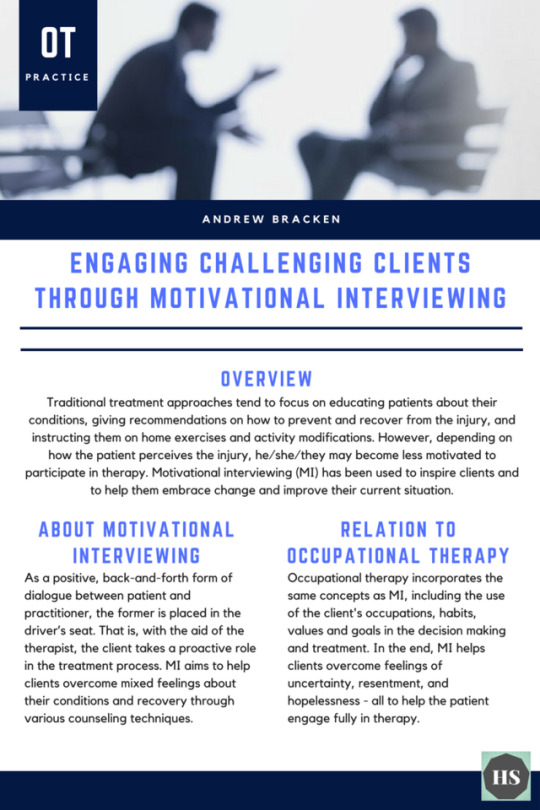
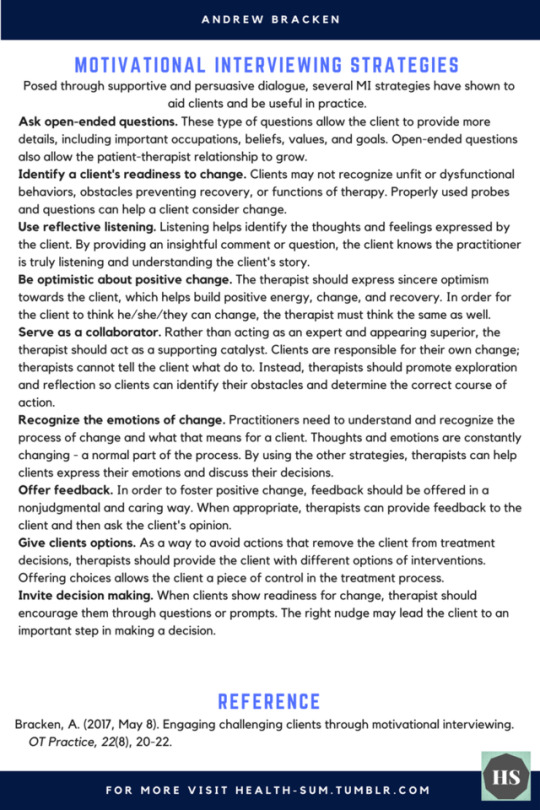
Engaging Challenging Clients Through Motivational Interviewing
Andrew Bracken
(click image for better resolution)
Source OT Practice - Volume 22, Issue 8; May 8, 2017
Keywords Motivational interviewing, therapeutic use of self, client-centered, skills
Overview Traditional treatment approaches tend to focus on educating patients about their conditions, giving recommendations on how to prevent and recover from the injury, and instructing them on home exercises and activity modifications. However, depending on how the patient perceives the injury, he/she/they may become less motivated to participate in therapy. Motivational interviewing (MI) has been used to inspire clients and to help them embrace change and improve their current situation.
Access stable URL (login required): https://www.aota.org/~/media/Corporate/Files/Secure/Publications/OTP/2017/OTP-Volume-22-Issue-8-hands.pdf
APA Citation Bracken, A. (2017, May 8). Engaging challenging clients through motivational interviewing. OT Practice, 22(8), 20-22.
#ot practice volume 22 issue 8#therapeutic use of self#skills#motivational interviewing#client centered
1 note
·
View note
Photo
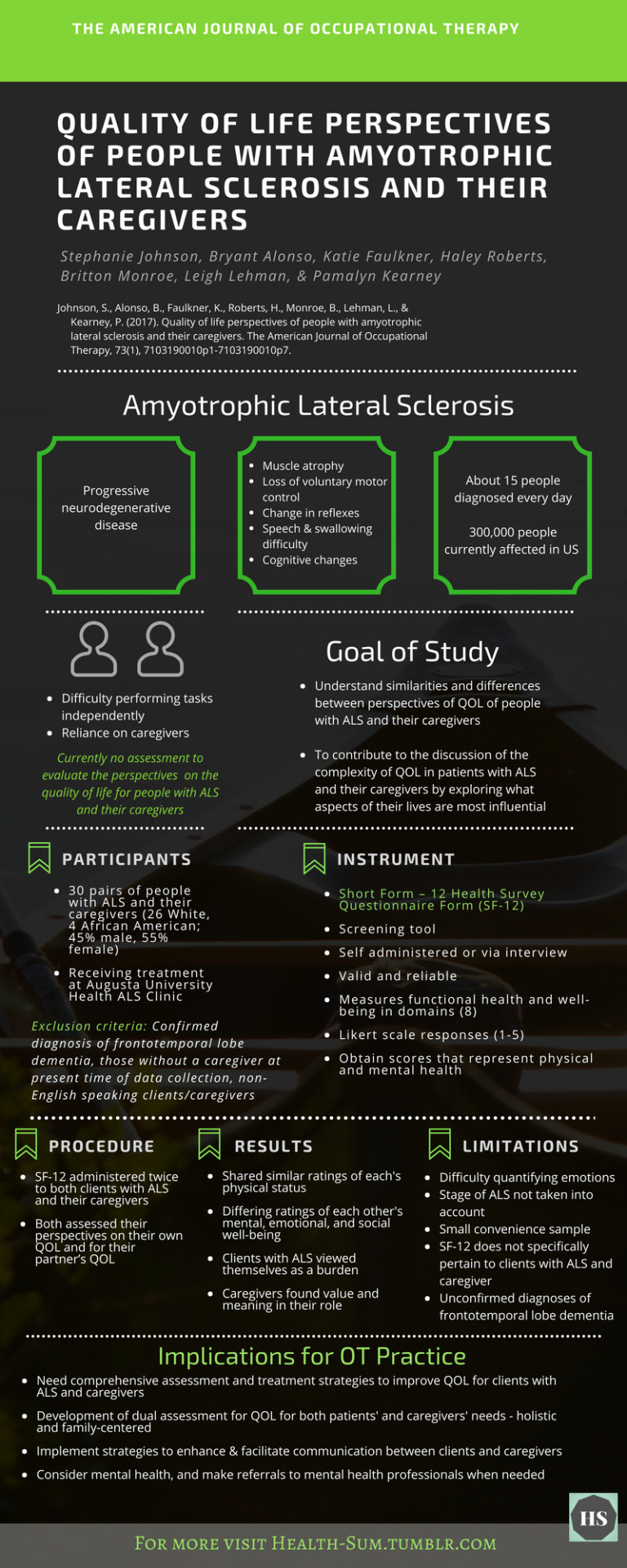
Quality of Life Perspectives of People with Amyotrophic Lateral Sclerosis and Their Caregivers
Stephanie Johnson, Bryant Alonso, Katie Faulkner, Haley Robert, Britton Monroe, Leigh Lehman, & Pamalyn Kearney
(click image for better resolution)
Source The American Journal of Occupational Therapy - Volume 73, Issue 1; May/June 2017
Keywords quality of life, amyotrophic lateral sclerosis, als, caregiver
Overview This goal of this study was to understand the perspectives of people with ALS and their caregivers on their quality of life and to contribute to the discussion of the complexity of quality of life. There is currently no assessment to evaluate the perspectives of quality of life of clients with ALS and their caregivers.
Access stable URL (login required): http://ajot.aota.org/article.aspx?articleid=2614806 DOI: 10.5014/ajot.2017.024828
APA Citation Johnson, S., Alonso, B., Faulkner, K., Roberts, H., Monroe, B., Lehman, L., & Kearney, P. (2017). Quality of life perspectives of people with amyotrophic lateral sclerosis and their caregivers. The American Journal of Occupational Therapy, 73(1), 7103190010p1- 7103190010p7. doi:10.5014/ajot.2017.024828
0 notes
Text
We Want to Hear from You!

Tell the HealthSum Team Your Interests and Suggestions
As a new blog hoping to provide easy-to-read and useful information regarding health and research, we want to provide information that’s most important to you.
Either through inbox, email ([email protected]), or reply to this post, tell us about the topics you want to read about.
Topics can include, but are not limited to:
Adaptive equipment, like home modifications, school modifications, etc.
Neurological conditions, like Alzheimer’s, Parkinson’s, etc.
Common pediatric conditions, like Autism Spectrum Disorder, Cerebral Palsy, Attention Deficit Hyperactivity Disorder, etc.
Most prevalent diagnoses, like diabetes, stroke, heart attack, etc.
Thank you for your support!
#health#wellness#adaptive equipment#neurological conditions#alzheimer's#alzheimer's disease#parkinson's#parkinson's disease#autism#autism spectrum disorder#asd#cerebral palsy#cp#attention deficit hyperactivity disorder#adhd#diabetes#stroke#heart attack#pediatric#adult#geriatric#signal boost
16 notes
·
View notes
Photo
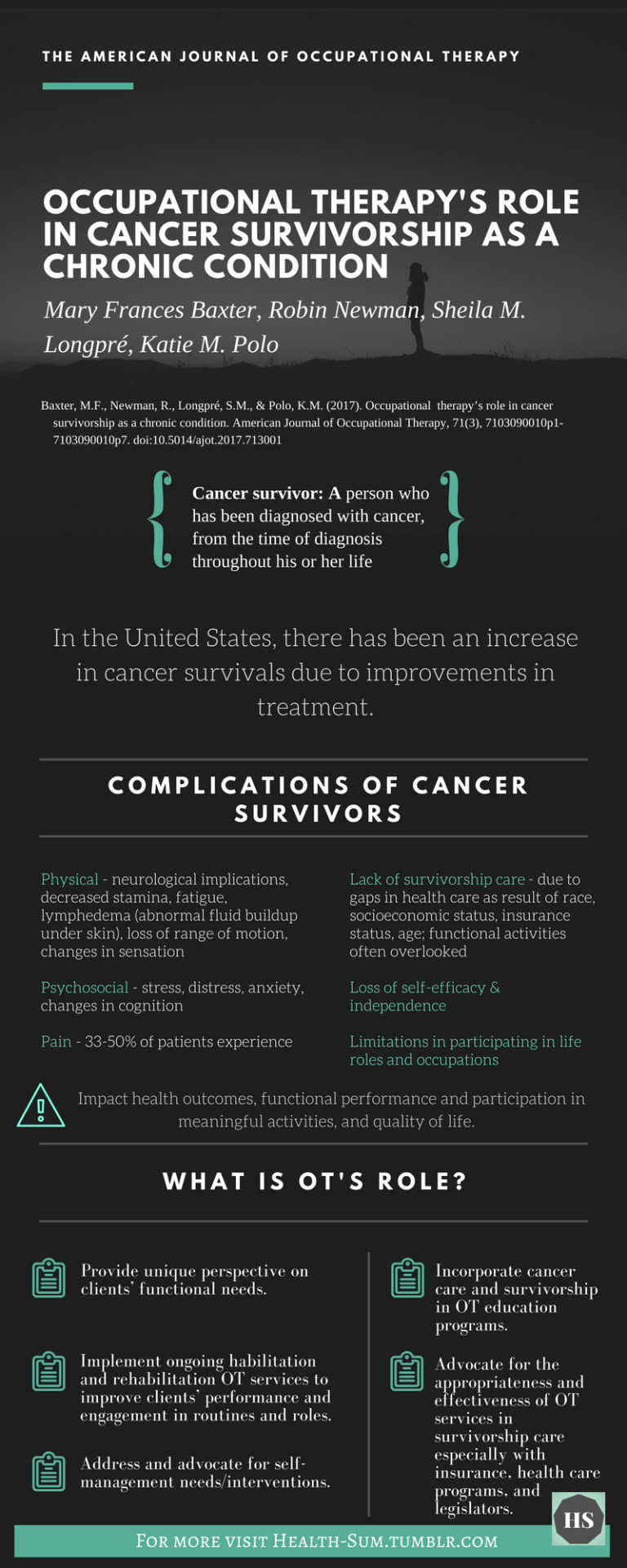
Occupational Therapy’s Role in Cancer Survivorship as a Chronic Condition
Mary Francis Baxter, Robin Newman, Sheila M. Longpré, & Katie M. Polo
(click image for better resolution)
Source The American Journal of Occupational Therapy - Volume 71, Issue 3; May/June 2017
Keywords cancer, cancer survivorship, chronic condition
Overview In the United States, there has been a rise in cancer survivors due to treatment improvements. However, many cancer survivors face multiple complications that impede on their performance and participation in their meaningful roles and routines. There is an increased need and role for occupational therapy in cancer survivorship care.
Access stable URL (login not required): http://ajot.aota.org/article.aspx?articleid=2614803&resultClick=3 DOI: 10.5014/ajot.2017.713001
APA Citation Baxter, M.F., Newman, R., Longpré, S.M., & Polo, K.M. (2017). Occupational therapy’s role in cancer survivorship as a chronic condition. American Journal of Occupational Therapy, 71(3), 7103090010p1-7103090010p7. doi: 10.5014/ajot.2017.713001
0 notes
Photo
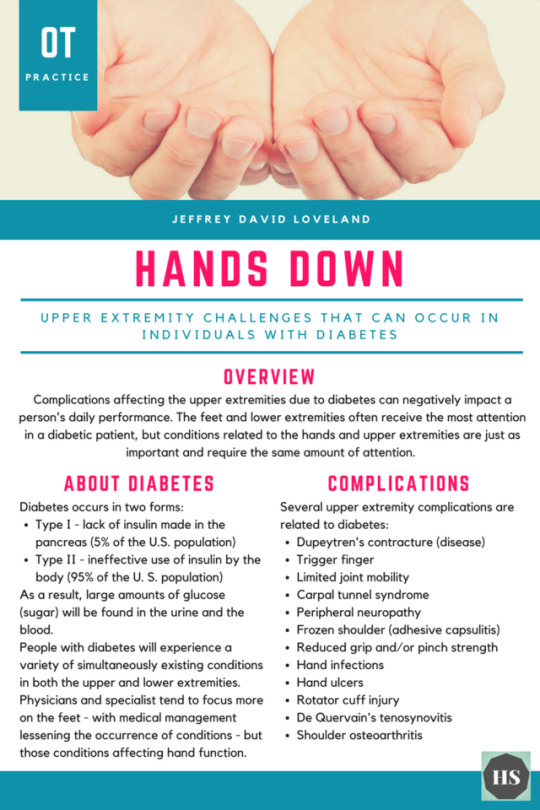
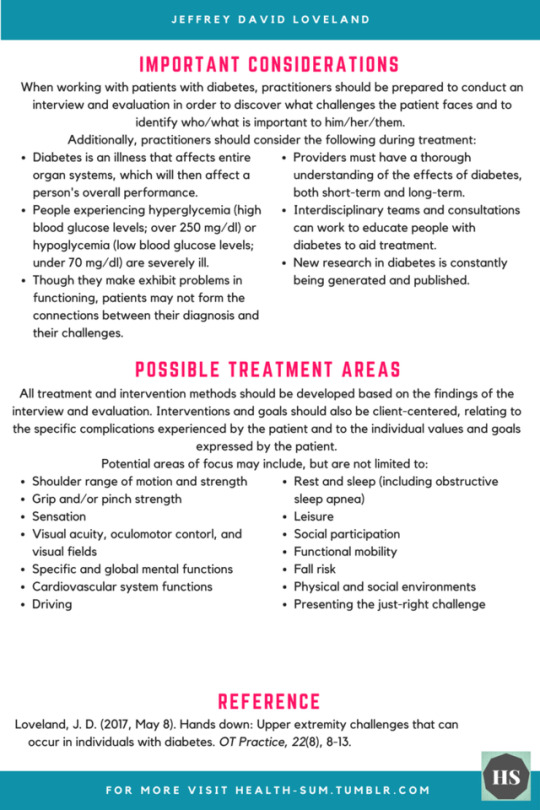
Hands Down: Upper Extremity Challenges That Can Occur in Individuals With Diabetes
Jeffrey David Loveland
(click image for better resolution)
Source OT Practice - Volume 22, Issue 8; May 8, 2017
Keywords Hands, arms, upper extremities, diabetes
Overview Complications affecting the upper extremities due to diabetes can negatively impact a person's daily performance. The feet and lower extremities often receive the most attention in a diabetic patient, but conditions related to the hands and upper extremities are just as important and require the same amount of attention.
Access stable URL (login required): https://www.aota.org/Publications-News/otp/Archive/2017/05-08-17-hands/Hands-Down-Upper-Extremity-Challenges-Diabetes.aspx
APA Citation Loveland, J. D. (2017, May 8). Hands down: Upper extremity challenges that can occur in individuals with diabetes. OT Practice, 22(8), 8-13.
0 notes